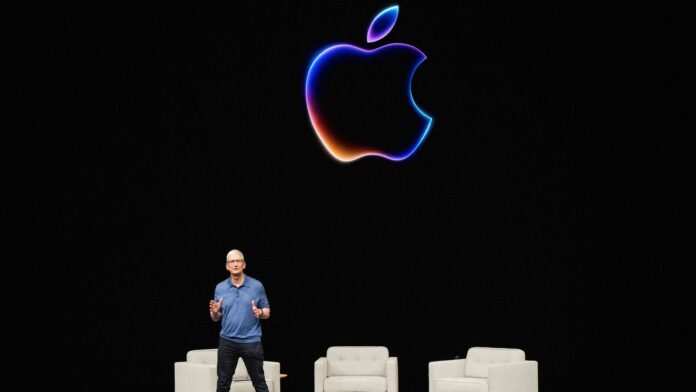Apple Inc, as we learnt this week, aims to simplify artificial intelligence (AI) for the masses in a bid to keep its users and shareholders engaged and happy. Its goal is billed as “AI for the rest of us,” reminiscent of Steve Jobs’ strategy of making computers aesthetic and user-friendly. While CEO Tim Cook may lack Jobs’ charisma, he kept Apple’s allure well polished.
At least until the rise of AI, that is, particularly generative AI, a field in which it began to look like a laggard, with its Siri voice assistant outclassed by smarter AI chatbots. As a result, Apple lost its position as the world’s most valuable company to AI-focused Microsoft and even briefly to fabless chip-maker Nvidia.
That Apple, Microsoft and Nvidia, all currently valued above $3 trillion, are vying for the top spot underscores just how high the AI stakes have risen. Apple’s late but measured response to the AI race includes its launch of Apple Intelligence—a shot at making the ‘A’ of AI stand for its own name. We can expect a smarter Siri and a renewed focus on user privacy in a world rife with misinformation, scams and deepfakes.
Given its consumer focus, Apple is dedicated to enhancing our AI experience even as other tech giants focus on foundational AI models and infrastructure for enterprises. Trying to recast AI as Apple Intelligence is part of this strategy. This tactic is not unique, though; IBM uses ‘augmented intelligence,’ while Nvidia promotes ‘accelerated computing’ and Intel speaks of a ‘Siliconomy.’
That said, Apple’s AI announcements have not made tech mavens sit up, let alone rave. Yet, Apple has a history of refining and surpassing useful stuff invented by others. Sony’s Walkman preceded the iPod and Nokia’s handsets came before the iPhone. Being a late entrant to a market hasn’t mattered, the user experience has. Apple’s strength is its consumer orientation, as seen in its aesthetics, quality and intuitive user interfaces.
It also has an ecosystem of its own that makes it hard for iPhone users to switch away. Analysts at Morgan Stanley highlight that Apple’s strong brand loyalty is driven by its close integration of products and services that keeps switching costs high for users. This loyalty is reinforced by the vast amounts of personal data stored on its iCloud, which tends to keep its users invested.
The consumer-tech major’s current emphasis on data privacy will only strengthen this loyalty. With OpenAI’s GPT-4 integration, Siri will perform tasks like playing movies or scanning emails for information, but will ask for user consent before going online to get more data if needed. On the flip side, users with iPhone 15 or older models might be frustrated as they would need to upgrade their devices to access Apple’s new AI features.
Apple’s new OS-level features could disrupt tech startups offering basic AI services like grammar checks, copy-writing, summarization and transcription, as these tasks get commoditized. This means startups cannot rely solely on calling themselves AI or GenAI businesses; they will need strong technological differentiation, a loyal user base, robust partnerships and leadership that’s comfortable with change being the only constant.
Apple’s success so far also shows that being a first mover in the tech world is not always an advantage. The company’s own challenge will be to keep up its record of innovation in the AI space without losing its feel for—and edge on—the user experience that has been the hallmark of its success.
#Apple #late #race #steady
